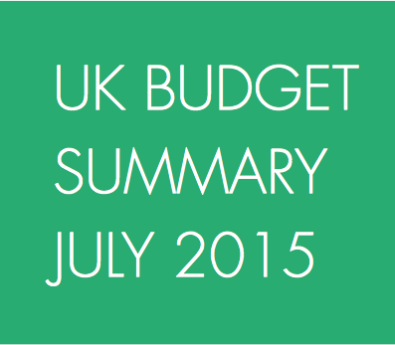“A BUDGET FOR WORKING PEOPLE”
In the first uniquely Conservative produced Budget since 1996, the Chancellor of the Exchequer, George Osborne, announced that, “Our long-term economic plan is working” and added that the “economy is fundamentally stronger than it was five years ago.”
His avowed intention was to create “a plan for Britain for the next five years to keep moving us from a low wage, high tax, high welfare economy; to the higher wage, lower tax, lower welfare country we intend to create.”
IN DETAIL…
Whilst the economy grew by 3% in 2014, he expects 2015 to see UK growth of 2.4%, followed by rises of 2.3% and 2.4% in 2016 and 2017 respectively. As a direct result of this growth, he believes that almost one million new jobs will be created by 2020.
The deficit will continue to be reduced, turning to a surplus by 2019- 20 and Government borrowing will fall from £69.5bn in 2015 to £43.1bn, £24.3bn, £6.4bn and finally turning into a surplus of £10bn by 2019-20.
National debt, as a share of Gross Domestic Product (GDP), is to fall from 80.3% in 2015, to 79.1%, 77.2%, 74.7%, 71.5% and then 68.5% in successive years.
Pay rises in the public sector will continue to be frozen at 1% for the following four years.
By 2020 he expects spending cuts to reach £37bn, with £12bn of those coming from welfare cuts and £5bn from clamping down on tax avoidance. The remainder will be obtained through efficiency gains in Government departments.
FOR BUSINESSES
On the business front, Corporation Tax (currently 20%) will be reduced to 19% in 2017 and then to 18% by 2020.The Bank Levy rate will be gradually reduced over the next six years; however, a new 8% surcharge on bank profits will be introduced in January 2016.
The National Insurance Employment Allowance for SMEs will be increased to £3,000 from 2016, a 50% increase, and, at the same time, the Government will introduce a new Apprenticeship Levy for large employers.
Renewable electricity suppliers will see the removal of the Climate Change Levy.
Insurance Premium Tax is to be increased in November to 9.5% and a cap will be introduced on the charges made by claim management companies.
A RADICAL CHANGE TO PENSIONS
The Chancellor announced a radical change to pension legislation, that would require considerable discussion and hence he announced a forthcoming Green Paper to address pension tax relief on a wider basis. He did, though, state that tax relief on pension contributions would be tapered away to a minimum of £10,000 per annum for individuals with ‘income’ over £150,000.
TAX CHANGES
Income tax changes included an increase in the annual tax free allowance to £11,000pa in 2016, rising to £12,500pa by 2020. The higher rate tax threshold has been increased to £43,000, effective next April.
The controversial issue of non-domiciled tax status has been addressed by the abolition of permanent non domicile from April 2017 and those who have lived in the UK for 15 of the past 20 years will pay the same level of tax as other UK residents.
“TAX CREDITS AND UNIVERSAL CREDIT, FOR CHILDREN BORN AFTER APRIL 2017, ARE TO BE RESTRICTED TO TWO CHILDREN.”
Mr Osborne has increased the budget of HMRC by £750m to help them recoup up to £7.2bn of tax, currently believed lost to both aggressive tax avoidance and tax evasion.
Phased in from 2017 the Inheritance Tax (IHT) threshold will be increased to £175,000 by 2020/21 on the value of homes, thereby ensuring that £1m of most married couples’ and civil partners’ home value will be free of IHT when left to their children and grandchildren.
Mortgage Interest Relief, currently enjoyed by Buy-to-Let landlords, will be reduced to the basic rate of income tax from 2020, but the Rent-a-room relief scheme will be increased to £7,500pa.
NATIONAL LIVING WAGE
Importantly, the Chancellor announced the introduction of a new ‘National Living Wage’, starting in April 2016, for all workers aged over 25 years. This will start at £7.20 an hour and rise to £9.00 per hour by 2020. The existing over-21 Minimum Wage is £6.50 per hour.
Fuel duty remains unchanged, but he made no mention of alcohol, gambling, or tobacco duties.
WELFARE COSTS
As expected, welfare costs took centre stage, as the Chancellor has targeted this area for £12bn of savings.
Working-age benefits, which include Tax Credits and local Housing Allowance will be frozen for four years
Tax credits and Universal Credit, for children born after April 2017, are to be restricted to two children, whilst the earnings level to obtain Tax Credit Withdrawal has been reduced from £6,420pa to £3,850pa.
Automatic Housing Benefit will be withdrawn for 18-21-year-olds and they will be obliged to “earn or learn”.
Annual Household Benefit cap will be reduced from the current £26,000 pa, to £23,000 for those households living in London and to £20,000pa for those living elsewhere.
At the same time Employment and Support Allowance to claimants who are considered able to work, will be “aligned” with the current Jobseeker’s Allowance.
Higher income households, that is those earning above £40,000 in London and £30,000 elsewhere, and currently renting social housing, will be obliged to pay rents at the market rate. However, other rents in the sector will be reduced by 1% a year for the next four years. Housing Association tenants are also to be given the right-to-buy.
The present Disability Allowance will remain and will not be means- tested at delivery.
The state pension ‘triple lock’ – where automatic annual increases will be made at the higher of the current inflation rate, average earnings growth, or 2.5% – will remain.
Student Maintenance Grants, which are currently paid to students from households with incomes lower than £42,000pa, are to be replaced by loans of £8,200, with effect from the 2016-17 academic year. These to be repaid by the students after their future annual earnings surpass £21,000 a year.
The support for Mortgage Interest Scheme will be converted into a loan, some home owners repay the financial support they receive.
THE NHS
The political hot potato of the National Health Service (NHS) was addressed by the announcement of an additional £8bn of investment by 2020. This is in addition to the £2bn of investment that had been previously announced by the Government.
National defence and security is to be ensured as the Government committed to spending 2% of GDP on defence, meeting the current NATO spending target. It also committed to increasing this spend, in line with real terms, every year. The threat of homeland terrorism will be countered by an investment of £1.5bn into a newly created Joint Security Fund.
TRANSPORT
From 2017 new VED bands will be introduced, as now set according to emissions.
There will be three duty bands, zero emission, standard and premium. For standard cars – 95% of all cars sold the charge will be £140 per year, with no VED charge for existing cars. Any revenue derived from this source will be ring-fenced for new road building and road maintenance.
The government will consult on extending the deadline for new cars and motorbikes to have their first MOT test from 3 to 4 years.





